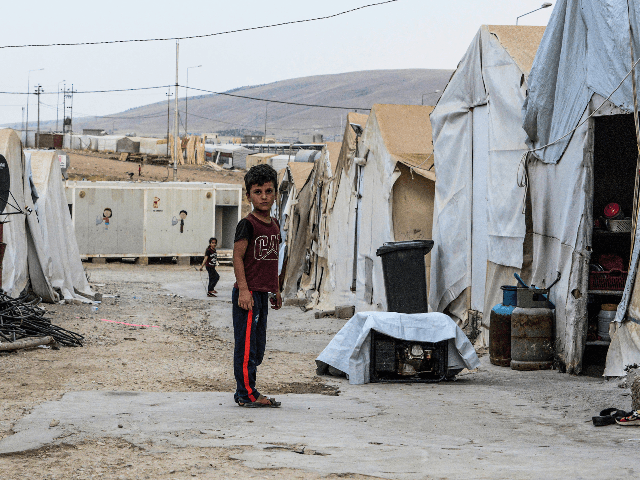The Kurdistan Regional Government (KRG) of Iraq announced a “total lockdown” of its capital province, Erbil, on Sunday, in an attempt to stop the spread of the Chinese coronavirus.
The region, Erbil Governor Firsat Sofi said in a press conference Sunday, was facing a public health “catastrophe” as the pandemic’s spread accelerates throughout northern Iraq.
The KRG is an autonomous region run by the nation’s ethnic Kurdish minority, currently struggling not just to protect citizens from the Chinese coronavirus but from an ongoing land and air invasion by Turkey, whose officials argue military hostilities are necessary to destroy the Kurdistan Workers’ Party (PKK), a U.S.-designated Marxist terrorist organization. The KRG leadership has for years repudiated the PKK, but the group has established a base in northern Iraq, particularly in Sinjar, home to the nation’s Yazidi ethnoreligious minority. Locals there have told media outlets that the PKK played a key role in defeating the Islamic State during its genocide of the Yazidis that began in 2014.
Turkey launched “Operation Claw-Eagle” in the air and “Operation Claw-Tiger” on land two weeks ago. It has since resulted in the evacuation of at least nine northern KRG villages, a mass movement of people that may lead to the faster spread of the Chinese coronavirus.
The Kurdish outlet Rudaw reported on Sunday that the entirety of Erbil province, not just the eponymous capital city, would be on “total lockdown” for five days starting Tuesday, meaning residents will only be allowed outside their homes for “essentials” and cars will not be allowed on the roads at all. “All civilian movement will be prohibited,” the outlet noted.
“The current measures taken are not sufficient to control the outbreak of the virus. There are dangerous indications of a catastrophe if we do not take the necessary steps,” Erbil Governor Sofi said in remarks on Sunday, emphasizing that anything but dramatic measures to curb the spread of the disease would result in a situation “out of our control.”
Sofi warned that the lockdown would be “harsh” but necessary.
Outside of Erbil, a similar lockdown will take hold on Tuesday in Kirkuk, about an hour and a half’s drive south of Erbil. Kirkuk is an oil-rich, multi-ethnic city that became a de facto part of the KRG when the Islamic State attacked it in 2014 and Baghdad’s police and military fled. Following the demise of the Islamic State and an attempt to secede by the KRG in 2017, Baghdad allowed the Popular Mobilization Forces (PMF/PMU), a coalition of Iran-backed militias, to invade and force ethnic Kurds out of the city. At least 100,000 Kurds fled Kirkuk during the PMF occupation.
As of Sunday, the entire KRG has documented 5,672 cases of Chinese coronavirus and 186 deaths. Saturday was Kurdistan’s record day of documenting cases; doctors identified 350 positive cases that day throughout the region. The total number of deaths in one day also hit a record at 18 that day.
The growing fear of an uncontrolled epidemic in Kurdistan has not stopped Turkey’s invasion activities, which are triggering a mass exodus from areas targeted by Turkish airstrikes. Kurdish news outlets reported that eight villages in northern Iraq had been evacuated as a result of “Operation Claw-Eagle.” The Kurdish outlet Bas News reported on a ninth on Sunday, Shilane, a village in Batifa, Duhok, another KRG province.
“Batifa Mayor Dilsher Abdulsattar told BasNews that the conflict has spread panic among the villagers in the border areas, forcing many to flee their homes in fear of bombardments on the villages,” the outlet noted. Abdulsattar said a tenth village was also preparing to flee.
Where the residents of these villages will go is unclear. The KRG is home to large refugee camps housing the victims of the Islamic State, particularly those from places like Sinjar or Mosul, once a city of two million people. The densely populated conditions in a refugee camp can often be ideal for spreading disease.
Kurdistan 24 published a video this weekend of the airstrikes that villagers are fleeing, in particular the bombing and destruction of a Duhok farm. Locals told the outlet that the Turks had destroyed “hundreds of acres” of agricultural property, threatening the food safety of locals.
Other “Operation Claw-Eagle” targets last week included the rubble of former Sinjar city, destroyed by the Islamic State genocide of the Yazidis, and a resort village for families in Sulaimani province, KRG.
“It is very unfortunate. … Many villagers have been forced to flee their homes. All of their orchards and groves have caught fire,” Babakir Fage, a spokesman for the KRG’s Peshmerga Affairs Ministry, told Rudaw in an interview published this weekend. “And in the name of chasing Kurdistan Workers Party (PKK) members, they targeted civilians at Kuna Masi resort [Sulaimani province].”
Fage noted that Ankara did not bother to alert the KRG or the Peshmerga, its affiliated militia, despite the typically positive relations between the KRG and Turkey and tensions between the KRG and the PKK, who KRG officials repeatedly urge to leave Iraq.
“We also call on the PKK of Turkey to take into account the sovereignty of the Kurdistan Region. They have to understand that this Region has came into being with a huge amount of sacrifice, blood and struggle of the KRG,” Fage asserted. “They must take their struggle back to the land of North Kurdistan [southeastern Turkey].”
At least one Turkish soldier has died in the operation, according to the Turkish state-run news service Anadolu Agency. Anadolu claimed the soldier “was martyred in a clash with terrorists” in the KRG.
“Turkey’s operations Claw-Tiger and Claw-Eagle were launched last week to ensure the safety of the Turkish people and borders by neutralizing the threat of the PKK and other terrorist groups, who often use northern Iraq to plan cross-border attacks,” Anadolu asserted.

COMMENTS
Please let us know if you're having issues with commenting.